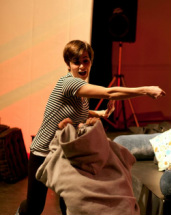 From BURNING UP THE DICTIONARY
From BURNING UP THE DICTIONARY
 From BURNING UP THE DICTIONARY From BURNING UP THE DICTIONARY Like any other design discipline, fight directing begins with the text. I'd like to take a moment to discuss approaching a text as a fight director and/or a movement specialist. While it's obvious that the play must be read before any other work is done, what one is looking for when they read and how one's findings are utilized hasn't had a whole lot of public discussion.
0 Comments
Review of SHIN GI TAI: KARATE TRAINING FOR BODY, MIND, AND SPIRIT by Michael Clarke (YMAA: 2011)11/17/2013 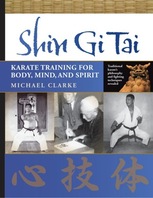 The review below was originally commissioned by The Journal of Asian Martial Arts, just before the journal discontinued their print edition. I am presenting it on my blog as I feel that this book is deserving of attention. I've added a small handful of hyperlinks for the purposes of this post. Shin Gi Tai: Karate Training for Body, Mind, and Spirit by Michael Clarke (YMMA: 2011) Michael Clarke’s Shin Gi Tai: Karate Training for Body, Mind, and Spirit is simultaneously an auto-ethnography of a prominent Karateka, a series of history lessons on the system as a cultural practice, and an anthropological analysis of the current state of karate from a very definite perspective. Instructionally, it is not so much a “how to” book, but a guideline for those who are finding their own way (though there are detailed descriptions of example exercises). 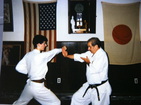 I've recently been asked several times (in part because of my recent article in Backstage, though there is some irony there) about best practices in picking a martial art. Now, there are several people far wiser and far more badass than me who have a bit to say on the topic, but I suspect that I reach a different demographic. I also intend to address studying martial arts for the purpose of improving oneself as a choreographer and/or performer. I'll also address self defense training a bit and how it might differ from what you might usually think of in martial arts. Before I go much further, I'd say the first law in picking any physical discipline has already been laid down by Rory Miller: "Train in something that makes it a joy to move." That being said... 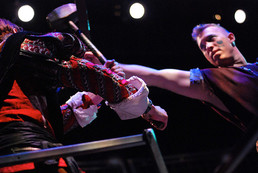 PETER PAN @ Tufts University - Photo by Elizabeth Herman PETER PAN @ Tufts University - Photo by Elizabeth Herman Attention Young Actors: You don't always know what you think you know. This is especially true when it comes to stage combat. And you may want to think twice before you claim it on a resume. This is true even if you took a workshop or two and/or performed fights onstage a handful of times. I'm talking mostly about the "Special Skills" section of the resume. As many of you know, common wisdom dictates that you should not put anything down on there that you cannot do on short notice. I want to work on the assumption that people are making their claims in good faith (liars are a whole other issue). That one would not put down a language that they do not speak, an instrument they do not play, or claim a degree that they have not earned. But unfortunately, sometimes stage combat ends up on an acting resume when it really shouldn't be...  Not very long ago I shot an abuse-prevention training video/PSA at Triangle Inc with Ablevision as part of their new IMPACT: Ability program. The last time I acted on camera was a little over a year ago for Malarkey Films, which in turn was the first time I'd done that in several years. That shoot involved a stuffed monkey puppet and a gas mask. This project however, had a significantly more serious tone. It was great to be a performer again, as very few other arts have the same degree of immediate gratification. I had almost forgotten how fun it is. This however, was not a typical shoot... On My Experience @ TEX: Tufts Idea Exchange & The Value of Informal Education on the Internet2/27/2012  This past November I was one of two alumni speakers at TEX: Tufts Idea Exchange. TEX is an event inspired by and modeled on TED. If you are not familiar with TED, do yourself a favor and click that link. Be sure that you don't have anyplace important to be for a while. I'm coming back to this long-overdue post now in part because I've noticed through social media that they're soliciting speakers again, and to urge anyone among my readership in the Tufts community to apply. And also, anyone with access to any similar events, like TEDx for instance, to make a point of going and/or somehow getting involved. (I met many of the people involved in TEDxSomerville, and they are awesome, one of the TEX presenters will actually be speaking at their event). For something even more informal, check out NerdNite. I want to talk specifically about TEX, and generally about what events like this have to offer. Let's start with my presentation and go from there... 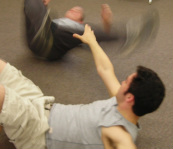 A few weeks ago I wrote at some length about the general utility of studying stage combat. I touched on the subject of falls at the time, but I'd like to go into it in a little more depth here. As I've said before, falls are a surprisingly high risk activity on stage, in part because in many circumstance performers do not even realize that they are at risk. Many are surprised to learn that they constitute an important part of stage combat training. It doesn't take a whole lot of thought to realize why falls are both so important (because you can hurt yourself on the way down to the ground in myriad ways) and so often overlooked (because they are so obvious). Before going much further I need to acknowledge that there are written sources on falls from fight directors far more advanced than myself. By way of example, an excellent technical manual is Combat Mime: A Non-Violent Approach to Stage Violence by J.D. Martinez, is one of the standard texts on unarmed combat and a book I strongly recommend for anyone pursuing any long-term study of physical performance. Anyway, let's talk a bit about falling on stage or screen. (Like some of my other posts, this is probably an early draft of something that I'll expand into a more in-depth article or paper later on.) "Professional Fight Director and Stage Combat Instructor" is apparently one of the best jobs one can possibly have when attending a cocktail party (though for the record, I would like to state that I always say "Playwright" first). A surprising amount of intelligent and educated people are unaware that the job actually exists. And once they do know, there is a lot of curiosity about how our work is done.
Recently I've been teaching a whole lot of Intro to Stage Combat workshops in various settings, and I have a few more coming up in the near future. I've been saying for quite some time that the basics of stage combat are essential skills for actors, as well as incredibly useful for other disciplines within theatre & film. I would also say that taking such a workshop could also be a really interesting adventure for those outside of professional entertainment. I've written a whole lot about this subject (a dissertation and several articles) and have been the subject some interviews and so on in this capacity as well, so some of what I'm saying here I've said before, but anything I'm repeating is worth writing about again. The first priority of a fight director is the safety of the performers. For a profession with such a badass reputation, the practitioners spend a whole lot of time and energy being concerned with the well-being of everyone involved. Stage combat has more in common with a combination of ballroom dance and stage magic that it does with any actual fighting discipline. Once an illusion is decided upon, it becomes a matter of figuring out how to best execute it within the skill level of the cast and in the time allotted. This can be as "simple" as someone being slapped and/or falling down, or as complex as a duel to the death with chainsaws. The illusion must also further the story being told and support character development. If the fight director has done their job well it should be nearly impossible to determine where the director's work ended and where the fight director's has begun. I'd like to take a moment to discuss why the the study of stage combat is important and why acquiring some familiarity with the skills involved in portraying violence in performance should be given some priority across the various disciplines. "Be well versed in the arts of pen and sword." - Miyamoto Musashi, The Book of Five Rings
I recently joked that on principle, scholars of John Milton and Paradise Lost should all skydive. In part because the opportunity to fall screaming from Heaven like Lucifer himself would be wonderful fieldwork. And also because the study of great literature should be visceral. This was because not so long ago I went skydiving to celebrate my graduation from my doctoral program, and also because lately I've been having more and more realizations about what I've come to call "fightaturgy," or, the dramaturgical revelations of the analysis of violence and movement implied in a performance text and their effect on character development in a play. I brought this up in a recent conversation with my friend and colleague Ryan Hartigan, which led me to realize that I need to write about this if I'm going to keep talking about it. A few of my current projects have some great examples: |
Taking Note & Taking Notes
Meron Langsner, PhD
Playwright, Theatre & Performance Scholar, Fight Director/Movement Specialist, Director, Educator Archives
June 2020
Categories
All
|
 RSS Feed
RSS Feed